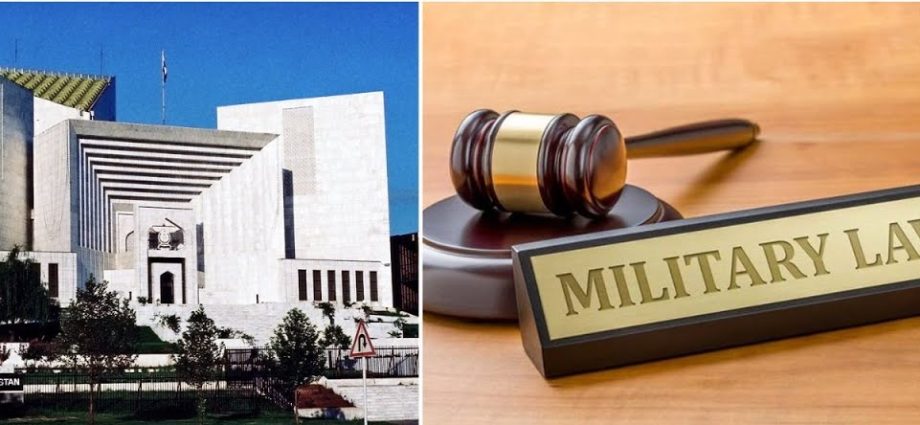Can Civilians Be Tried in Military Courts? – Justice Jamal Khan Mandokhel
If a person commits a crime under the Army Act, the trial will take place in a military court – Justice Muhammad Ali Mazhar
We are examining whether the 2-1 and D-1 can be declared null and void or not; military courts deal with specific cases – Khawaja Haris
You are stepping outside your jurisdiction, the question is, can you try civilians? – Justice Musarat Hilali
“I have been shown a law that states that anyone who appears in court in a personal capacity must also adhere to the lawyer’s code of conduct” – Justice Aminuddin Khan
Islamabad (Web News)
The Constitutional Bench of the Supreme Court of Pakistan, which is hearing review petitions on the matter of civilian trials in military courts, canceled the case list for two days. Meanwhile, the bench, upon the request of senior journalist Hafeezullah Khan Niazi, the father of Hissan Khan Niazi (the nephew of former Prime Minister Imran Khan), sought a report from the Punjab government on the facilities provided to prisoners sentenced by military courts at Kot Lakhpat Jail, Lahore, as per jail manuals. On Tuesday, Khawaja Haris Ahmad, the lawyer for the Ministry of Defense, continued his arguments, and will continue his arguments on Wednesday as well.
The head of the Constitutional Bench, Justice Aminuddin Khan, remarked that those sentenced by military courts would receive rights as per the jail manual. The Attorney General had assured that the rights under the jail manual would be provided. Justice Jamal Khan Mandokhel remarked that the establishment of military courts was justified for maintaining discipline in the armed forces, but the question is whether civilians can be included in this system. He posed a simple question: can civilians be included in the law or not? According to Article 8-3 of the Constitution, no law can be made that violates fundamental human rights.
The Ministry of Defense is an executive institution, and if a crime is committed against the executive, can it act as a judge in its own case? The division of powers in the Constitution is clear. The bench asked whether the 26th constitutional amendment could be disregarded or not. Pakistan’s penal code exists; this law was specifically made for the armed forces. The bench did not declare the entire law null and void, but only declared the amendment null and void. We are bound by the Constitution. We need to see whether the law can be amended or not.
Justice Muhammad Ali Mazhar remarked that the majority decision of the Supreme Court has stated that military courts are not against Article 175 of the Constitution. If a person commits a crime under the Army Act, their trial will take place in a military court. During Martial Law or the period of LFO, basic rights are suspended. Justice Musarat Hilali remarked that the extension of powers is leading to civilian trials, and the question is whether civilians can be tried. Khawaja Haris responded that he was looking at whether the provisions 2-1 and D-1 could be declared null and void.
The Constitutional Bench, led by Justice Aminuddin Khan, and comprising Justices Jamal Khan Mandokhel, Muhammad Ali Mazhar, Syed Hassan Azhar Rizvi, Musarat Hilali, Naeem Akhtar Afghan, and Shahid Bilal Hassan, began hearing the case in Courtroom Number 2 of the Supreme Court. The bench adjourned the hearings for other cases on the cause list and confirmed that the hearing would focus on military court cases.
The Ministry of Defense’s lawyer, Khawaja Haris, took the podium and argued that the Supreme Court had previously stated that civilians could be court-martialed under the military’s jurisdiction. Justice Jamal Khan Mandokhel questioned whether, under Article 8-3, which addresses the discipline and duties of military personnel, laws could be made that allow civilian trials in military courts. He asked if the executive could decide its own cases and questioned the separation of powers outlined in the Constitution.
Khawaja Haris argued that military courts operate under the authority of the Army Act, and if there is no other forum, the executive can make a decision. The judges continued to deliberate on whether military courts could try civilians or whether such laws could be applicable to civilian matters.
During the hearing, Hafeezullah Khan Niazi, a senior journalist, asked for permission to speak, commenting on the conditions of prisoners sentenced by military courts in Kot Lakhpat Jail. He claimed that the prisoners were being denied their rights under the jail manual and were being held in high-security areas, not with other prisoners. The bench instructed the Punjab government to respond to these concerns.
The hearing was adjourned for the day with plans to continue the next day, and it was confirmed that the Constitutional Bench would only hear cases regarding military courts.

